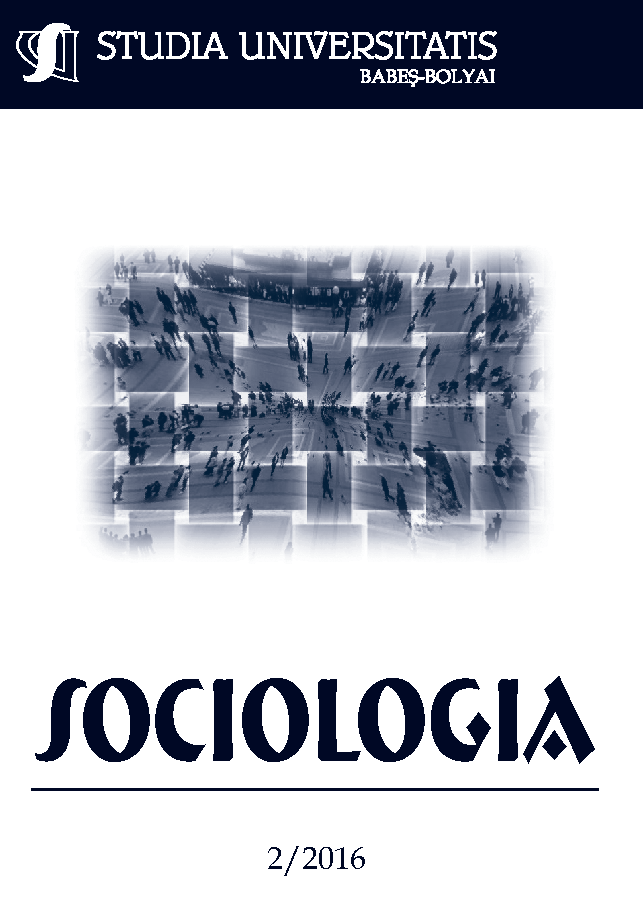THE QUEST FOR THE SPIRITUAL SELF: ANTI-CAPITALIST AND NEO-LIBERAL FORMS OF SPIRITUALITY IN CONTEMPORARY ROMANIA
Keywords:
modernity, secularization teleology, personal/spiritual development, Neo-Paganism, (anti)capitalist forms of spiritualityAbstract
In line with socio-anthropological theories meant to deconstruct the secularization teleology (Berger, 1997; Luckmann, 1967; Shah, 2015), this paper aims to document recent transformations in the field of Spirituality and Religion. Inheriting the analytical dichotomy between neo-liberal and anti-capitalist forms of spirituality, introduced by Carette and King (2005), I aim to emphasize both the common points and the ruptures between the subjectification technologies used within transformative self-development and self-help programmes, on the one hand, and a form of alternative Neo-Pagan spirituality, which opposes the capitalist way of organizing social, economic, political and cultural life, on the other hand. The rupture between anti-capitalist and neo-liberal forms of spirituality rests on identifying the extent to which the spiritual domain is colonized by an economically mundane ideology, in which the subject is invited to look upon spirituality as an internal resource meant to satisfy all the tropes of the neo-liberal economic imagery: optimization, efficiency, amplified productivity, abundance and prosperity. In addition to the ethnographic justification of this theoretical construct that supports the existence of two opposed poles of constituting a spiritual self, I will adjoin the cultural relationship between spirituality and capitalism to the wider problem of secularization, by arguing that spirituality is a byproduct of late modernity and a leitmotif of the power technologies through which the neo-liberal subject is produced.
References
Berger, P. (1967). The sacred canopy: Elements of a sociological theory of religion. New York: Anchor Books.
Bruce, S. (2002). God is dead: Secularization in the West. Oxford: Blackwell.
Bonewits, I. (2005). What Neo-pagans Believe or Neo-pagan Polytheology 101 [online], Available at: http://www.neopagan.net/NeopagansBelieve.html, [Accessed 01.07.2017].
Carrette, J., King, R. (2005). Selling Spirituality. The Silent Takeover of Religion. New York: Routledge.
Costello, J. (2001). Nursing older dying patients: findings from an ethnographic study of death and dying in elderly care wards. Journal of Advanced Nursing, 35(1):59-68.
De Lange, F. (2011). Inventing yourself: How Older Adults Deal with the Pressure of Late-Modern Identity Construction. In Kenyon, G., Bohlmeijer, E., Randall, W.L. (eds.). Storying Later Life. Issues, Investigations, and Interventions in Narrative Gerontology. New York: Oxford University Press, pp. 51-66.
Denzin, N. K. (1978). The Research Act: A Theoretical Introduction to Sociological Methods. New York: McGraw-Hill
Dobbelaere, K. (1981). Secularization: A Multi-Dimensional Concept. Current Sociology, 29(2).
Dobbelaere, K. (2002). Secularization: An analysis at three levels. Brussels: Peter Lang.
Durkheim, E. (1965). The Elementary Forms of the Religious Life. New York: The Free Press.
Gallagher, E. (1994). A Religion without Converts? Becoming a Neo-Pagan. Journal of the American Academy of Religion, 62(3):851-867.
Giddens, A. (1991). The Consequences of Modernity. Stanford: Stanford University Press, pp. 1-53.
Gilsenan, M. (2000). Signs of Truth: Enchantment, Modernity and the Dreams of Peasent Women. The Journal of the Royal Anthropological Institute, 6(4):597-615.
Gog, S. (2007). Raționalizarea sferelor de valori și problema dezvrăjirii lumii la Max Weber. [The Rationalization of Value Spheres and The Disenchantment of the World in Max Weber’s Work]. ORMA. Revistă de studii etnologice și istorice-religioase [ORMA. Magazine for Ethnological, historical and religious studies], 6:26:54.
Gorski, P. S. (2000). Historicizing the Secularization Debate: Church, State and Society in Late Medieval and Early Modern Europe, ca. 1300 to 1700. American Sociological Review, 65(1), 138-167.
Greenwood, S. (2000). Magic, Witchcraft and the Otherworld. An Anthropology. Oxford: Berg.
Jorgensen, D.L. & Russel, S.E. (1999). American Neopaganism: The Participants’ Social Identities. Journal for the Scientific Study of Religion, 38(3):325-338.
Luckmann, T. (1967). The Invisible Religion, New York: Macmillan.
Rose, N. (1999). Governing the Soul: The Shaping of the Private Self. London: Free Association Books.
Michel, A. (1997). Differentiation vs. Disenchantment: The Persistence of Modernity from Max Weber to Jean-François Lyotard. German Studies Review, 20(3):343-370.
Saler, M. (2006). Modernity and Enchantment: A Historiographic Review. The American History Review, 111(3): 692-716.
Seidman, S. (1983). Modernity, Meaning and Cultural Pessimism in Max Weber. Sociological Analysis, 44(4):267-278.
Shah, T. S. (2015). Secular Militancy as an Obstacle to Peacebuilding. In Omer, A. (ed.). The Oxford Handbook of Religion, Conflict, and Peacebuilding. New York: Oxford University Press, pp. 380-407.
Strmiska, M.F. (2005). Modern Paganism in World Cultures. Comparative Perspectives. Santa Barbara: ABC Clio.
Tschannen, O. (1991). The Secularization Paradigm. A Systematization. Journal for the Scientific Study of Religion, 30(4):395-415.
Wallace, A. (1966). Religion. An Anthropological View. New York: Random House.
Wilson, B. (1981). Religion in Sociological Perspective. Oxford: Oxford University Press.
Wuthnow, T. (1998). After Heaven: Spirituality in America Since the 1950s. Berkeley: University of California Press.
Downloads
Published
How to Cite
Issue
Section
License
Copyright (c) 2016 Studia Universitatis Babeș-Bolyai Sociologia

This work is licensed under a Creative Commons Attribution-NonCommercial-NoDerivatives 4.0 International License.






